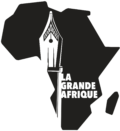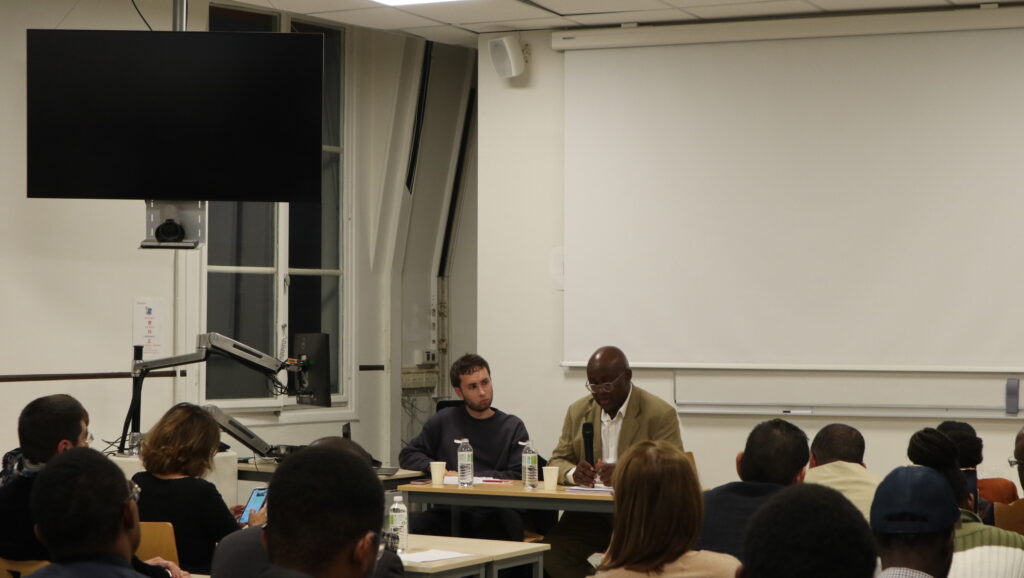“Of all the presidents of the 5th Republic, Macron has the most coherent discourse on Africa.”
On Wednesday, October 2, 2024 [1], renowned postcolonial scholar and Sciences Po alumnus Achille Mbembe honored us with a lecture on the Saint-Guillaume campus. The lecture focused on the evolving relations between France and its former colonies. More concretely, Mbembe provided us with a complex analysis of the alleged tensions between the Sahel region and France, as well as a verdict on Macron’s handling of the situation since the beginning of his mandate in 2017. Old interviews and interventions by Mbembe on the subject served as starting points for new arguments. The conversation, rich in reflections on contemporary challenges in Africa, touched on a variety of topics and events, ranging from the restitution of precolonial artifacts to Afrocentric democracy to neo-sovereignism. The main ideas and conclusions shared by Mbembe are presented in this lecture summary.
Changes in relations between France and Africa: the Ouagadougou speech and Macron’s vision.
Discussing the relationship between France and its former colonies – particularly in West Africa – since Macron’s arrival, Mbembe defends the thesis that the evolution and distancing of (neo-)colonial ties. Something he defends first of all by referring to the famous Ouagadougou speech, in which Macron affirmed that he wanted to initiate real procedures for the restitution of property stolen during colonization. [2] Let us recall the challenging words of the newly elected president at the time: “I cannot accept that a large part of the cultural heritage of several African countries is in France… African heritage must be highlighted in Paris but also in Dakar, Lagos, Cotonou, this will be one of my priorities. I want the conditions to be met within five years for temporary or definitive restitution of African heritage in Africa.” [3] Added to this, in Mbembe’s words, is Macron’s awareness that other relics of colonization, including the CFA Franc and military bases, are now also a problem. More broadly, this can be seen as a recalibration of Africa’s new geopolitical air, marked by a pluralization of external actors (Turkey, the Gulf countries, China, Russia, etc.).
Beyond these reforms of France’s historical posture under its new president, Macron’s vision, according to Mbembe, is new in expressing confidence in entrepreneurial voluntarism. Concretely, the French president believes that a combination with the forces of the international market can be a decisive driver of the development of the African continent. This new analysis of the former colonial power seems to want to exploit the demographic, technological and social changes taking place on the continent, particularly in terms of gender relations.
We can therefore say that Macron has gone to the end of his concept. But that does not mean that there is nothing more to do. Consequently, I think that it is now time to opt for the policy of the right distance. France is already doing this for the majority of African countries; it is time to do it for its former colonies as well. A methodically organized break is needed. But a break is needed.
Neo-sovereignism; a “flat” Pan-Africanism based on the rejection of France.
To address the issue of sovereignty on the African continent, Mbembe returns to his ancient roots, which he dates to the 15th century. According to him, this can be seen as the way in which Africa entered modernity. The demand for this sovereignty, over the centuries, took many forms – anti-colonial struggles, the two world wars, etc. These periods of pressure for greater sovereignty were, on the African side, marked by trans-class and trans-generational coalitions, where the young almost systematically bore the heaviest burden. The Pan-Africanist movement was surely the major example of this kind of period. Supported by leaders and a particularly young intellectual class, the political project supported the idea of an African continent capable of weighing as an autonomous and co-responsible actor in the world. An idea, therefore, of universalist and democratic African sovereignty, with the aim of extending the fields of rights and freedoms, not hesitating to openly fight against conflicts of race, class, gender, and identity.
This brings us to the current political landscape of West Africa, particularly in the former French colonies. A landscape marked by radical political changes and coups d’état, considered by many to be the legacy of this pan-African ideal that has declined in recent decades. Mbembe, on the other hand, considers his new neo-sovereignist actors [4], as being first and foremost defined by an anti-French sentiment. The crystallization of an imaginary and an affect in response to the shocks that have affected the countries of the African continent since the 1970s. Particularly the ‘Structural Adjustment Plans’, forcing recently independent countries to repay their debts and go to the IMF and the World Bank, which was detrimental to the ability of said countries to make their own choices. What we are witnessing today therefore has, according to Mbembe, nothing to do with the heart of Pan-Africanism. It is rather a populist instrumentalization of political-intellectual ideas. An instrumentalization that is largely done through social networks and other digital platforms. But in the end, this is not very important. What must take precedence is the imaginary and the affects that it produces, as well as its political consequences.
Mbembe therefore invites us to redirect towards the movements of funds and transformation of which the repeated coups in the region are, according to him, only simple symptoms. The continent is in flux, and we must accept this while trying to fit into its long times and its cycles. The said cycle – and the tension – which seems the most crucial today according to Mbembe is that of the accumulation of private goods and means of predation. We can see it more explicitly in the growing inequalities, largely stimulated by the inclusion of African markets in the global economy and, consequently, the intensification of extractive industries. If we do not return to this political economy, we are wasting our time.
Despite the critical look at the neo-sovereignists, Mbembe therefore affirms that it is undeniable that this movement is part of the conversation on the future of the former French colonies in Africa. Just like its opponents, who wish that the relationship with France does not change. It is through these oppositions, and the tensions that emerge from them, that his countries will trace their future trajectories. For Mbembe, it is therefore important, particularly for France, to engage in its internal conflicts, and to respect the victors. If we do not succeed, it is Ukraine or Gaza that awaits us.
For an Afro-centric democracy
Many countries such as the United States of America, Germany, the Netherlands, and Scandinavian countries finance their versions of democracy and try to export it to the African continent by finding local allies. France, in itself, also has the right to participate in this. According to Mbembe, it can even be seen as a democratic tax that they must pay to the countries of the African continent, and particularly to the former colonies.
Based on this reading, Mbembe asserts that there is, through the spaces that this funding creates and the conversations that it stimulates, also an opportunity to stimulate a democratic model specific to the ways of doing things and the multiple legacies of Africa. A democracy that is not administrative and procedural, but substantive. This requires research on its endogenous democratic methods.
To achieve this effort, it is necessary to have an intellectual rearmament, and an investment in the collective intelligence of the continent. Reconciling research and practice, allowing us to form new social coalitions and invent a democracy based on the care of the living and respecting African cosmologies.
[1] Note that this conference was held before the controversies of Macron and the French government towards Haiti and Mayotte.
[2] https://www.jeuneafrique.com/1332502/culture/restitutions-malgre-les-controverses-macron-tient-sa-promesse/
[3] Ibid.
[4] https://www.peoplesworld.org/article/alliance-of-sahel-states-a-breakthrough-for-pan-africanism-and-decolonization/ https://www.lemonde.fr/en/le-monde-africa/article/2024/04/02/senegal-s-faye-urges-more-solidarity-in-africa-against-security-challenges_6667156_124.html

